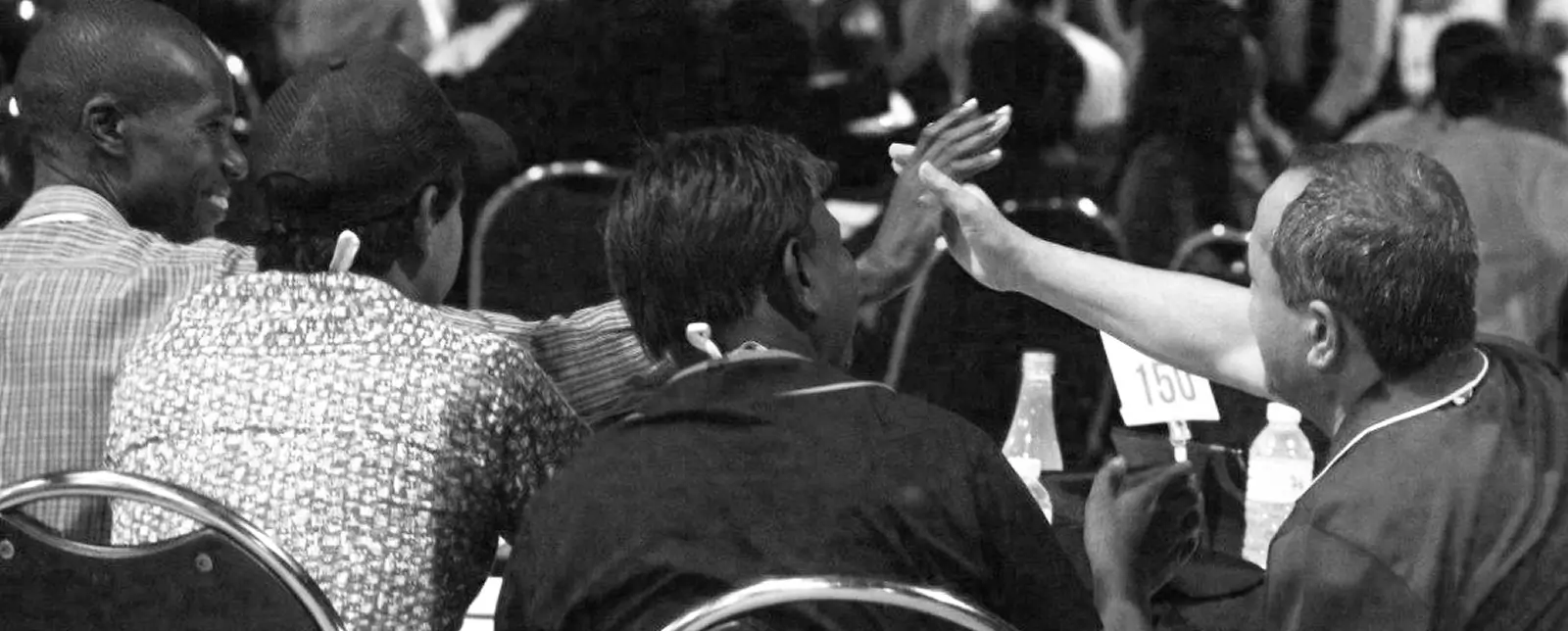
Global Report
GLOBAL INTEGRATED REPORT:
Data, Cost, Partners, Impact
Initiatives & Activities in the Training of Pastors Worldwide
2016-2020
(for public release mid-2021)

EXECUTIVE SUMMARY
Introduction
Church growth without church health is much like cancer in the human body. Since church health is affected by pastoral health, the training of pastors is critical to the health of Christ’s Church.
Need
Documentation of initiatives and activities in training pastors worldwide. This data will provide for the strategic direction and immediate action by all trainers of pastors. We must reduce the number of untrained and isolated pastoral leaders, especially where Christ’s Church is growing.
Purpose
The GProCommission has sought to capture in statistical form the number of pastors being trained around the world by various pastoral training organizations and institutions, churches, and individuals. The GProCommission acknowledges the immense work of the respective trainers of pastors which further reinforces the great need and opportunity in the training of pastoral leaders, especially where Christ’s Church is growing. The data collected is for statistical purposes only and provides a database for all who want to know how many pastoral leaders have been trained, how many are being trained, and who is training them.
Response
The Global Proclamation Commission for Trainers of Pastors (GProCommission hence)
The GProCommission serves as
- connector of trainers of pastors
- curator of resources for the training of pastors
- collator of initiatives and activities in the training of pastors
- convener of events1 to gather trainers of pastors on a micro and/or macro scale.
Output
The GProCommission for Trainers of Pastors Integrated Report 2020
Data2 was gathered July 1, 2016 to June 30, 2020 from attendees of the 2016 Global Proclamation Congress for Trainers of Pastors, as well as other individual, organizational and institutional trainers of pastors who were introduced3 to this follow-up effort after the Congress. Sixty-six percent of the total number trained during the four-year follow-up were reported by GProCongress delegates.
The direct costs of this four-year follow-up, which included online and in-person elements in more than a dozen languages and collected training reports from every one of the world’s countries and many territories, was $671,1134 . RREACH is thankful to the generous friends and staff members who contributed toward this strategically important work of documentation to inform direction and action.
The total number of pastoral leaders trained are categorized according to geography, hours of training received, type of training received, topic of training received and other variables.
Conclusion
The stated goal of RREACH’s decade long (2010-2020) human capital campaign was to connect, unite, strengthen 100,000 better trained pastoral leaders by 2020. In order to cover errors in duplication, replication, or exaggeration, RREACH’s four-year follow-up process set out to document 500,000 pastoral leaders better trained for pastoral ministry, and then apply an extremely conservative 80 percent attrition rate to meet the goal. By July 1, 2020, the GProCentral team received reliable training reports that, after applying the highly cautious attrition rate, still presents 280,911 better trained pastoral leaders between 2016 and 2020. This Global Integrated Report 2020 meets its objective of documenting currently reported data on pastoral training activities and initiatives for statistical purposes and strategic priorities for trainers of pastors in every training sector and location.
SUBSET “A” TOTALS
Subset A (reports per country) Totals
The information shared in this section comes from geographically specific training reports. These reports comprise either face-to-face training or online training. The vast majority (98.6 percent) of all training reports received included a specific country where the training took place. The remaining reports did not include specific geographies for a variety of reasons, which are outlined in the Subset “B” section of the report.

Worldwide: number trained & hours of training* received
*Includes only reports of face-to-face training
Worldwide: total reported face-to-face versus online training
386,559
Total pastoral leaders trained
12,728
Total number of training events
275,322
Total number of training hours
Total Trained Per Country
Subset A training reported in 248 countries & territories and 41 languages
Most training events reported:
1. United States
3,011
2. India
1,938
3. China
1,057
4. Kenya
913
5. Costa Rica
842
Most number of training hours reported:
1. United States
141,846
2. Canada
22,082
3. India
16,223
4. Peru
10,097
5. China
9,000
Most pastoral leaders trained reported:
1. United States
(84,348)7
2. India
56,446
3. China
48,012
4. Egypt
20,517
5. Nigeria
17,95
SUBSET “B” TOTALS
The information shared in this section was provided by 19 international training organizations who, for a variety of reasons, did not break down their training reports by country. Thirteen of the organizations did list the countries where they provided training, but not the number trained in each country.
Subset “B” training was reported in 147 countries and territories
1,017,995
Total pastoral leaders trained
4,106
Total number of training events
59,577
Total number of training hours
Number of organizations providing training in each country
SOURCE
# TRAINED
Congress Delegate
70%
Referral
30%
TOPIC
# TRAINED
Theological Engagement
14.8%
Spiritual Engagement
77.6%
Missional Engagement
0.3%
Biblical Engagement
7.3%
PASTORAL TRAINER PROFILE
Common profile of those individuals reporting training.
Age:
48*
Tenure:
6-10* years
*with 56% reporting
Training an average of:
10 hours per event
Most often training in:
43%
English
4%
French
4%
Portuguese
21%
Spanish
4%
Arabic
24%
All others
Most often training on:
43%
Biblical Engagement
12%
Missional Engagement
28%
Spiritual Engagement
17%
All others9
45%
living in Asia
32%
living in Africa
14%
living in Latin America
9%
living in all other regions
REGIONAL REPORTS
Region: Africa
Total Pastors Trained by Country
Countries with more than 1,000 pastors trained:
1. Nigeria: 17,951
2. Uganda: 17,308
3. Kenya: 16,097
4. Ethiopia: 5,082
5. Ghana: 3,987
6. Tanzania: 3,171
7. Zambia: 3,024
8. Rwanda: 2,788
9. South Africa: 2,618
10. Cameroon: 2,517
11. Liberia: 2,489
12. Burkina Faso: 2,457
13. Togo: 2,216
14. DR Congo: 1,907
15. Sierra Leone: 1,544
16. Mozambique: 1,382
17. Niger: 1,303
18. Benin: 1,277
19. Guinea: 1,162
20. Ivory Coast: 1,080
21. Chad: 1,049
Languages Represented:
English
French
Arabic
Amharic
Spanish
Swahili
Hausa
Kinyarwanda
Chitonga
Ndau
Criólo
Macau
Shangana
SOURCE
# EVENTS
# TRAINED
Congress Applicants
18%
13%
Congress Delegates
65%
72%
Referral
17%
15%
TOPIC
# EVENTS
# TRAINED
Spiritual Engagement
33%
62%
Biblical Engagement
30%
25%
Missional Engagement
18%
8%
Educational Engagement
8%
1%
All Others
11%
4%
Region: Asia
Total Pastors Trained by Country
Countries with more than 1,000 pastors trained:
1. India: 56,446
2. China: 48,012
3. Philippines: 6,376
4. Nepal: 6,356
5. Indonesia: 3,827
6. Pakistan: 3,292
7. Myanmar (Burma): 1,495
Number trained per region:
1. Central Asia: 0.1%
2. East Asia: 36.7%
3. South Asia: 51%
4. Southeast Asia: 12.2%
Languages Represented:
English
Tetun
Bengali
Portuguese
Dzongkha
Malay
Khmer
Mandarin
Chinese
Hindi
Tamil
Telugu
Malayalam
Bahasa
Indonesia
Russian
Mongolian
Burmese
Nepali
Urdu
Sinhala
Thai
Vietnamese
SOURCE
# EVENTS
# TRAINED
Congress Applicants
2%
1%
Congress Delegates
94%
92%
Referral
4%
7%
TOPIC
# EVENTS
# TRAINED
Spiritual Engagement
85%
89%
Biblical Engagement
8%
6%
Missional Engagement
2%
2%
Educational Engagement
2%
1%
All Others
3%
2%
Region: MENA
Total Pastors Trained by Country
Countries with more than 100 pastors trained:
1. Egypt: 20,517
2. Jordan: 347
3. United Arab Emirates: 160
Languages Represented:
1. Arabic
2. English
SOURCE
# EVENTS
# TRAINED
Congress Delegates
81%
68%
Referral
19%
32%
TOPIC
# EVENTS
# TRAINED
Biblical Engagement
11%
2%
Missional Engagement
21%
41%
Spiritual Engagement
68%
57%
Region: Latin America
Total Pastors Trained by Country
Countries with more than 500 pastors trained:
1. Costa Rica: 8,696
2. Brazil: 3,407
3. Peru: 2,342
4. Argentina: 2,051
5. Ecuador: 1,878
6. Panama : 994
7. Guatemala: 562
Languages Represented:
1. Spanish
2. Portuguese
3. English
SOURCE
# EVENTS
# TRAINED
Congress Applicants
1%
2%
Congress Delegates
44%
36%
Referral
55%
62%
TOPIC
# EVENTS
# TRAINED
Biblical Engagement in Pastoral Training
33%
43%
Educational Engagement in Pastoral Training
26%
8%
Missional Engagement in Pastoral Training
24%
7%
Spiritual Engagement in Pastoral Training
13%
33%
All Others
4%
9%
Region: Europe
Total Pastors Trained by Country
Countries with more than 500 pastors trained:
1. United Kingdom: 2,341
2. Germany: 937
3. France: 935
4. Netherlands: 911
5. Italy: 805
6. Russia: 794
7. Austria: 772
8. Switzerland: 535
Number trained per region:
1. Eastern Europe: 21.0%
2. Northern Europe: 14.0%
3. Southern Europe: 5.0%
4. Western Europe: 60.0%
Languages Represented:
English
Spanish
Russian
Romanian
Czech
Estonian
Greek
Arabic
Hungarian
Albanian
Portuguese
Ukrainian
SOURCE
# EVENTS
# TRAINED
Congress Delegates
17%
2%
Referral
83%
98%
TOPIC
# EVENTS
# TRAINED
Biblical Engagement in Pastoral Training
21%
46%
Missional Engagement in Pastoral Training
15%
1%
Spiritual Engagement in Pastoral Training
64%
53%
Region: North America
Total Pastors Trained by Country
Countries with more than 1,000 pastors trained:
1. Canada: 5,631
2. United States: 84,348
Languages Represented:
1. English
2. Spanish
SOURCE
# EVENTS
# TRAINED
Congress Delegates
0.3%
1.3%
Referral
99.7%
98.7%
TOPIC
# EVENTS
# TRAINED
Biblical Engagement
0.2%
0.6%
Missional Engagement
19.0%
9.0%
Spiritual Engagement
0.2%
1.8%
Theological Engagement
80.7%
88.6%
Region: Oceania, Caribbean & Antarctic
Total Pastors Trained by Country
Oceania
Caribbean
Antarctic Pastors Trained (Not pictured)
Antarctica (continent): 39
South Georgia & the South Sandwich Islands: 22
French Southern Territories: 15
Bouvet Island: 12
Heard Island and McDonald Islands: 10
Languages Represented:
Caribbean
English
Spanish
French
Arabic
Oceania
English
Antarctic
English
Russian
REGION
MOST TRAINING EVENTS REPORTED BY (SOURCE)
TRAINING MOST OFTEN ON (TOPIC)
Caribbean
Referral (52%)
Biblical Engagement (82%)
Oceania
Spiritual Engagement (60%)
Oceania
Referral (100%)
No Topics Reported
Total pastors trained by country
AFRICA
Angola: 652
Benin: 1277
Botswana: 73
Burkina Faso: 2457
Burundi: 870
Cameroon: 2517
Cape Verde: 61
Central African Repulic: 189
Chad: 1049
Comoros: 17
Congo: 495
Djibouti: 8
DR Congo: 1907
Equatorial Guinea: 22
Eritrea: 59
Ethiopia: 5082
Gabon: 255
Gambia: 160
Ghana: 3987
Guinea: 1162
Guinea-Bissau: 479
Ivory Coast: 1080
Kenya: 16097
Lesotho: 27
Liberia: 2489
Madagascar: 73
Malawi: 868
Mali: 235
Mauritania: 41
Mauritius: 73
Mayotte: 13
Mozambique: 1382
Namibia: 118
Niger: 1303
Nigeria: 17951
Reunion: 15
Rwanda: 2788
São Tomé & Príncipe: 76
Senegal: 322
Seychelles: 25
Sierra Leone: 1544
Somalia: 47
South Africa: 2618
South Sudan: 915
Sudan: 541
eSwatini: 113
Tanzania: 3171
Togo: 2216
Uganda: 17308
W.Sahara: 18
Zambia: 3024
Zimbabwe: 658
ANTARCTIC
Antarctica: 39
Bouvet Island: 12
French Southern Territories: 15
Heard Island & McDonald Islands: 10
South Georgia & South Sandwich Islands: 22
ASIA
Afghanistan: 51
Bangladesh: 689
Bhutan: 135
Brunei: 351
Cambodia: 983
China: 48012
Christmas Island: 14
Cocos Islands: 1
Hong Kong: 319
India: 56446
Indonesia: 3827
Japan: 84
Kazakhstan: 45
Korea, North: 15
Korea, South: 73
Kyrgyzstan: 47
Laos: 9
Macao: 8
Malaysia: 830
Maldives: 28
Mongolia: 79
Myanmar (Burma): 1495
Nepal: 6356
Pakistan: 3292
Philippines: 6376
Singapore: 941
Sri Lanka: 631
Taiwan: 80
Tajikistan: 47
Thailand: 210
Timor-Leste: 504
Turkmenistan: 21
Uzbekistan: 55
Vietnam: 616
CARIBBEAN
Anguilla: 32
Antigua And Barbuda: 89
Aruba: 33
Bahamas: 143
Barbados: 138
Bermuda: 58
British Indian Ocean Territory: 54
British Virgin Islands: 28
Cayman Islands: 30
Cuba: 1714
Dominica: 60
Dominican Republic: 188
Falkland Islands: 5
Grenada: 82
Guadeloupe: 21
Haiti: 342
Jamaica: 352
Martinique: 9
Martinique: 9
Montserrat: 12
Netherlands Antilles: 67
Norfolk Island: 39
Puerto Rico: 101
Saint Barthélemy: 3
Saint Helena: 9
Saint Kitts And Nevis: 39
Saint Lucia: 169
Saint Martin: 3
Saint Pierre And Miquelon: 11
Saint Vincent And The Grenadines: 50
Trinidad and Tobago: 179
Turks & Caicos Islands: 15
Virgin Islands (U.S.): 22
EUROPE
Åland Islands: 6
Albania: 71
Andorra: 64
Armenia: 60
Austria: 772
Azerbaijan: 17
Belarus: 87
Belgium: 326
Bosnia & Herzegovina: 38
Bulgaria: 277
Croatia: 43
Cyprus: 45
Czech Republic: 71
Denmark: 442
Estonia: 57
Faroe Islands: 12
Finland: 231
France: 935
Georgia: 63
Germany: 937
Gibraltar: 55
Greece: 82
Guernsey: 4
Hungary: 215
Iceland: 241
Ireland: 128
Isle Of Man: 2
Italy: 805
Jersey: 2
Kosovo: 19
Latvia: 107
Liechtenstein: 21
Lithuania: 45
Luxembourg: 49
Macedonia: 18
Malta: 54
Moldova: 54
Monaco: 23
Montenegro: 16
Netherlands: 911
Norway: 257
Poland: 360
Portugal: 76
Romania: 294
Russia: 794
San Marino: 31
Serbia: 25
Slovakia: 27
Slovenia: 45
Spain: 146
Svalbard & Jan Mayen: 16
Sweden: 335
Switzerland: 535
Turkey: 45
Ukraine: 160
United Kingdom: 2341
Vatican City: 2
Yugoslavia: 27
LATIN AMERICA
Argentina: 2051
Belize: 56
Bolivia: 86
Brazil: 3407
Chile: 209
Colombia: 480
Costa Rica: 8696
Ecuador: 1878
El Salvador: 114
French Guiana: 27
Guatemala: 562
Guyana: 490
Honduras: 207
Nicaragua: 97
Panama: 994
Paraguay: 61
Peru: 2342
Suriname: 24
Uruguay: 76
Venezuela: 184
MENA
Algeria: 57
Bahrain: 77
Egypt: 20517
Iran: 28
Iraq: 53
Israel: 59
Jordon: 347
Kuwait: 95
Lebanon: 54
Libya: 22
Morocco: 70
Oman: 41
Palestinian Territory Occupied: 14
Qatar: 51
Saudi Arabia: 67
Syria: 47
Tunisia: 49
UAE: 160
Yemen: 12
NORTH AMERICA
Canada: 5631
Greenland: 63
Mexico: 222
United States: 84348
OCEANIA
Australia: 1782
American Samoa: 43
Cook Islands: 45
Fiji: 107
French Polynesia: 8
Guam: 41
Kiribati: 21
Marshall Islands: 47
Micronesia, Federated States Of: 21
Nauru: 17
New Caledonia: 13
New Zealand: 267
Niue: 8
N. Mariana Islands: 13
Palau: 13
Papua New Guinea: 61
Pitcairn Islands: 12
Samoa: 20
Solomon Islands: 43
Tokelau: 12
Tonga: 14
Tuvalu: 13
Vanuatu: 93
Wallis And Futuna: 7
FINAL IMPACT
2016-2020 Final Impact
Pastoral leaders better trained for pastoral ministry
TARGET
500,000
with 80% potential error rate
GOAL
100,000
pastoral leaders
DOCUMENTED
1,404,544
TOTAL
280,911
minimum
16,834
Total Pastoral Training Events
334,899
Total Pastoral Training Hours
2,668
Total Pastoral Training Reports
14,319
Total GProLearning Resources
REPORTING INTEGRITY
- public documents
- pastor-trainer individuals and organizations known to or vetted by RREACH through the GProCongress application process.
- pastor-trainer individuals and organizations referred by trusted sources
- Formal training institutions-keep better records and have lower error rates
(N.B.: A conservative 80 percent attrition rate is applied across all pastor-training sectors.)
When reporting a training event, pastor trainers also were asked to supply:
- specific dates and/or total hours of training
- language and location of training
- other individuals or organizations involved with the training
Weekly meetings streamlined documenting processes across the report-gathering team.
The report-gathering team manager randomly contacted pastor trainers to review reports and ensure data was being collected correctly.
Line-by-line checks of reports revealed missing, conflicting or confusing data that report-gathering team members could validate or clarify with the reporting pastor trainer.
NOTES
- For more information, visit www.GProCongress.org.
- To confirm training reports, the GProCentral team asked verifying and clarifying questions, about the country and language in which the training occurred, dates and/or number of hours of the training event, and the topic of the training. They also asked if other trainers (individuals or organizations) were involved in the training reported. In 11 percent of all reports (representing 5.3 percent of the total number trained), the dates of and/or number of hours of the training were missing. In these cases, a one-day (8 hour) value was applied for each month represented in the training report.
- Those who contributed to this report but did not attend the 2016 GProCongress fall within four groups: (1) GProCongress applicants who were accepted to attend, but were unable to do so; (2) those referred to the GProCommission by an individual familiar with the project; (3) those referred to the GProCommission via a communication campaign to a larger audience of trainers of pastors; and (4) delegates of the Dallas Global Proclamation Academy (GProAcademy) and National GProAcademy programs, as part of RREACH’s overall ministry training strategy (https://rreach.org/ministry-training).
- Direct costs of follow-up relate to compensation for the team that collected the training reports, compensation for those directly organizing the efforts of that team, and the technology they used to securely store and track that data. Indirect costs for follow-up, including travel, support staff, communication and advancement efforts, totaled an additional $476,717. RREACH, as the parent of the GProCommission and the founder of TOPIC, considered this four-year undertaking a worthwhile investment of human and financial resources in view of the potential use of this report by pastoral training strategists for missiological focus and priority activity. Ramesh Richard’s article, “Training of Pastors: A high priority for global ministry strategy,” originally published in the September 2015 issue of the Lausanne Global Analysis, provides the rationale for this undertaking.
- Lists of individuals and organizations/institutions who contributed training reports for this project are clickable.
- If every individual, organization and institution who reported to us counted as one ministry, and if every entry in the Gordon Conwell report counted as one ministry, our respondents represent 8 percent of ministries listed in that report, not all of which are related to pastoral training.
- The Association of Theological Schools in the United States and Canada (ATS) data, representing more than 270 graduate schools of theology in the United States and Canada, is responsible for the United States being at the top of these lists. Other formal training accrediting bodies (similar to ATS and working in different regions of the world) did report numbers of graduates by member schools, but the data was not broken down by country or degree program, so “number of hours of training” was not applied. The Integrated Report, therefore, does not reflect the formal training taking place in those regions in the same way it does for North America.
- Subset B (1.4 percent of total reports, cf. Subset A, page 4) comprises 72.5 percent of total pastoral leaders better trained, 24.4 percent of total training events, and 17.8 percent of total training hours from organizational annual reports. Of the 19 pastoral training organizations, ten did not provide data on training events and/or training hours. Organizations not providing a list of countries where training occurred did so for the following reasons: 1. Training took place in restricted /unsafe countries 2. Training was tracked according to resource downloads, and therefore geographical information is not available.
- Tracks in Pastoral Training were grouped into 8 broader training categories, corresponding to eight tracks available at the 2016 GProCongress. Not all topics were represented or delivered in each region. Categories include: Biblical Engagement in Pastoral Training (ex. Biblical Knowledge, Biblical Interpretation, Biblical Preaching, etc.) Cultural Engagement in Pastoral Training (Ideas and Values, Moralities and Behavior, Media, etc.) Educational Engagement in Pastoral Training (Campus-based Delivery, Church-based Delivery, House-based Delivery, etc.) Missional Engagement in Pastoral Training (Evangelism, Discipleship, Church Planting, etc.) Obstacles in Pastoral Training (Economic Poverty, Conflict Zones, Persecution settings, etc.) Opportunities in Pastoral Training (Bi-Vocational Pastors, Immigrant Churches, Technology-based Delivery, etc.) Spiritual Engagement in Pastoral Training (Pastoral Leadership, Marriage and Family, Mentoring, etc.) Theological Engagement in Pastoral Training (Theological Essentials, Theological Discernment, Theological Formation, etc.)
THEME VERSE
“...but the word of God is not bound.”
2 Tim. 2:9
“Pastoral health affects church health. Church health affects societal health.”
— Ramesh Richard
2020 GLOBAL INTEGRATED REPORT
Data, Cost, Partners, Impact 2016-2020
